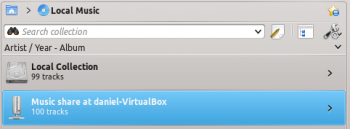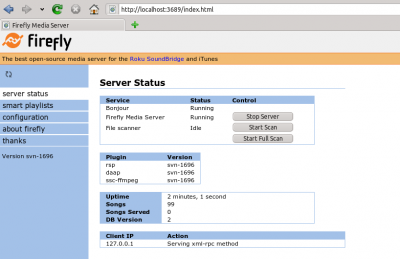Amarok/Manual/Organization/Collection/RemoteCollections/DAAP/pl: Difference between revisions
(Created page with "DAAP jest to protokół udostępniania mediów w sieci. Na początku używany przez iTunes, teraz szeroko rozpowszechniony.") |
(Created page with "===== Klient DAAP =====") |
||
| Line 5: | Line 5: | ||
DAAP jest to protokół udostępniania mediów w sieci. Na początku używany przez iTunes, teraz szeroko rozpowszechniony. | DAAP jest to protokół udostępniania mediów w sieci. Na początku używany przez iTunes, teraz szeroko rozpowszechniony. | ||
===== | ===== Klient DAAP ===== | ||
'''Amarok''' automatically shows the tracks from the server in the <menuchoice>Media Sources -> Local Music</menuchoice> pane and no further configuration is required. If the collection is not showing up, click the <menuchoice>Merged View</menuchoice> icon to be sure you are not in Merged View. | '''Amarok''' automatically shows the tracks from the server in the <menuchoice>Media Sources -> Local Music</menuchoice> pane and no further configuration is required. If the collection is not showing up, click the <menuchoice>Merged View</menuchoice> icon to be sure you are not in Merged View. | ||
Revision as of 20:00, 28 November 2011
Digital Audio Access Protocol (DAAP)
DAAP jest to protokół udostępniania mediów w sieci. Na początku używany przez iTunes, teraz szeroko rozpowszechniony.
Klient DAAP
Amarok automatically shows the tracks from the server in the pane and no further configuration is required. If the collection is not showing up, click the icon to be sure you are not in Merged View.

Server
On Debian-based distributions like Ubuntu you can install a DAAP server using
sudo apt-get install mt-daapd
This will install the Firefly DAAP server. You can configure it using its web interface by opening the page
http://localhost:3689/index.html
. The default password is mt-daapd; the user field stays empty.

